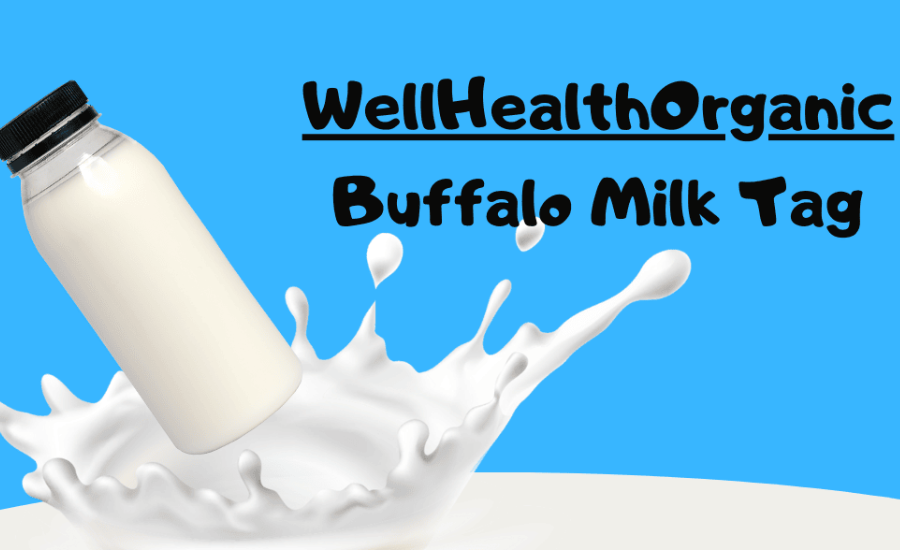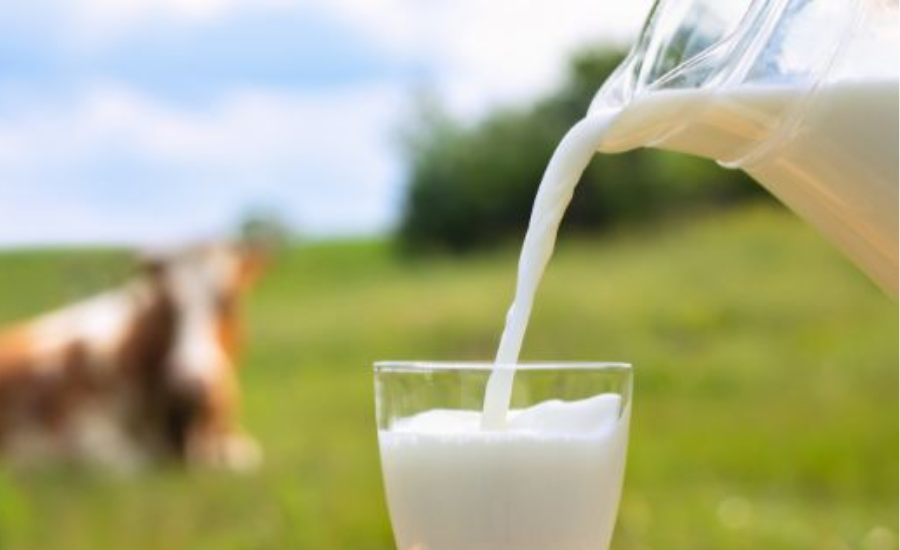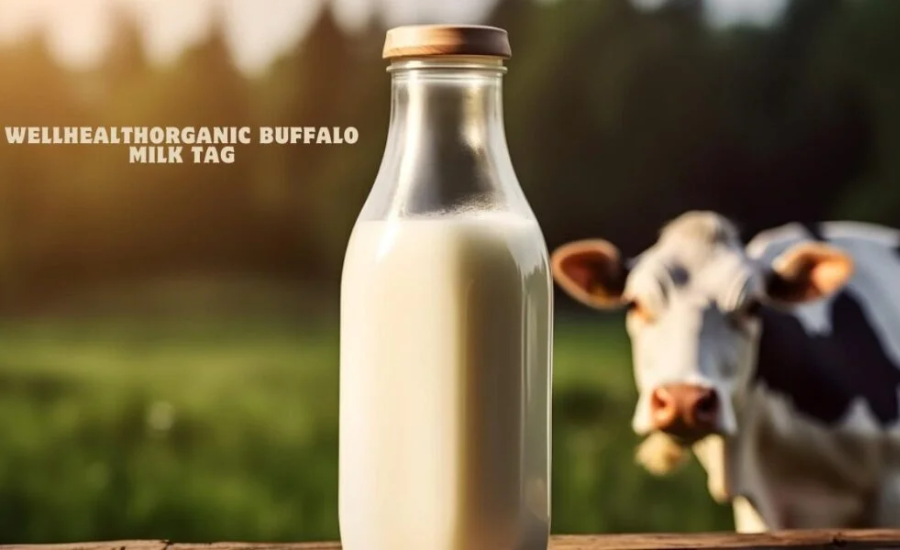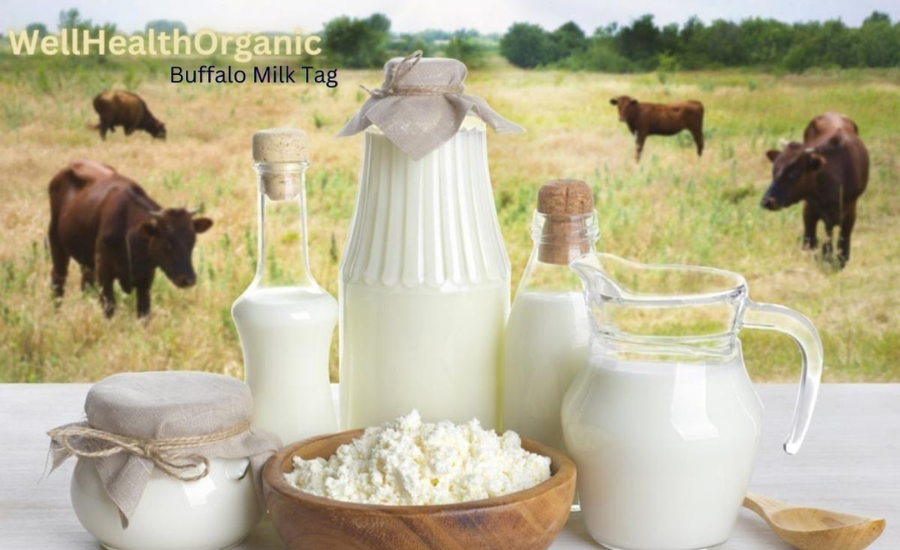Wellhealthorganic Buffalo milk tag, often overlooked in the dairy world, stands out as a nutritional powerhouse. With its rich, creamy texture and high-fat content, it offers an array of benefits that make it a fantastic addition to any diet. While it may not be as widely known as cow’s milk, buffalo milk has been a staple in various regions for centuries, and its popularity is steadily increasing worldwide. This guide will explore buffalo milk’s nutritional advantages, its diverse uses in various cultures, and how it compares to other types of milk.
Nutritional Breakdown of Buffalo Milk

Buffalo milk is a highly nutritious beverage, offering a range of macronutrients and micronutrients essential for maintaining health. It contains a higher fat content than cow’s milk, making it creamier and richer in texture. Below is an overview of the nutritional content found in buffalo milk (per 100ml):
- Calories: 97 kcal
- Fat: 6.9g
- Protein: 3.8g
- Carbohydrates: 5.2g
- Calcium: 195mg
- Magnesium: 18mg
- Potassium: 110mg
- Vitamin A: 60µg
- Vitamin D: 0.12µg
These values illustrate that buffalo milk is an excellent source of energy, protein, and essential vitamins and minerals.
Macronutrients
Buffalo milk is notably higher in fat and protein than cow’s milk, providing a richer and thicker texture. This higher fat content makes buffalo milk a more calorie-dense option. The fat found in buffalo milk is composed of beneficial fatty acids that contribute to overall health. In addition, the higher protein content supports muscle repair and growth.
Micronutrients
Buffalo milk is an abundant source of micronutrients that support bone health, muscle function, and overall wellbeing. It contains significant amounts of calcium, which is essential for bone development and strength. The milk is also a good source of magnesium and potassium, both of which are vital for heart and muscle function. Moreover, the high levels of vitamins A and D support immune function, vision, and skin health.
Health Benefits of Buffalo Milk

1. Boosts Immune System
One of the standout health benefits of buffalo milk is its ability to support the immune system. It is rich in antioxidants and vitamins such as vitamin C and vitamin A, which help protect the body from infections and illnesses. Regular consumption of buffalo milk can aid in strengthening the body’s defenses, making it more resilient to common colds, flu, and other infections.
2. Improves Bone Health
The high calcium and vitamin D content in buffalo milk makes it a powerful ally in maintaining strong bones. Calcium is a key mineral in bone formation and density, and vitamin D helps in the absorption of calcium, ensuring that the body can utilize it effectively. Consuming buffalo milk regularly can help reduce the risk of osteoporosis and fractures, especially in older adults.
3. Supports Heart Health
Despite its higher fat content, buffalo milk contains heart-healthy fatty acids. These beneficial fats help maintain healthy cholesterol levels and reduce the risk of cardiovascular diseases. Consuming moderate amounts of buffalo milk as part of a balanced diet can contribute to better heart health.
4. Enhances Skin Health
Buffalo milk’s rich nutrient profile, especially its vitamin A content, plays a significant role in promoting healthy skin. Vitamin A is known for its ability to support skin repair, reduce signs of aging, and promote a glowing complexion. The milk’s natural fats also help moisturize and nourish the skin, making it a great addition to beauty routines.
5. Aids in Muscle Growth and Repair
With its high protein content, buffalo milk is an excellent choice for individuals looking to build or maintain muscle mass. The protein in buffalo milk supports muscle repair after exercise and helps in the growth of new muscle fibers. Athletes and bodybuilders often incorporate buffalo milk into their diet to enhance muscle recovery and growth.
Buffalo Milk for Different Age Groups

For Children
Buffalo milk offers numerous benefits for growing children. Its rich nutrient profile supports bone growth, muscle development, and overall physical health. The high calcium content aids in the development of strong bones, while the protein supports muscle growth and repair. Buffalo milk can also contribute to a child’s overall energy levels, helping them stay active throughout the day.
For Adults
Adults can benefit from buffalo milk’s rich nutritional profile as well. The milk’s vitamins and minerals help support overall health, including bone density, immune function, and muscle maintenance. Consuming buffalo milk regularly can help adults maintain their health, energy levels, and physical vitality.
For the Elderly
Buffalo milk is especially beneficial for older adults due to its high calcium, protein, and vitamin D content. These nutrients help prevent bone loss, reduce the risk of fractures, and maintain muscle strength. For elderly individuals, buffalo milk can play a crucial role in maintaining their independence and quality of life by supporting bone health and muscle function.
Culinary Uses of Buffalo Milk
Buffalo milk is not only a nutritional powerhouse but also a versatile ingredient in the kitchen. Its rich texture and flavor make it a favorite for preparing various dairy products and culinary creations. Below are some of the ways buffalo milk is used in cooking:
1. Traditional Dishes
Buffalo milk plays a key role in many traditional dishes around the world. In India, it is used to make popular sweets such as rasgulla, pedha, and kheer. In Italy, buffalo milk is famously used to make mozzarella di bufala, a soft cheese that adds rich flavor to dishes like pizza, caprese salads, and pasta.
2. Modern Recipes
Buffalo milk is gaining popularity among modern chefs who experiment with it in innovative dishes. It can be used to create luxurious sauces, creamy soups, and rich desserts. The versatility of buffalo milk allows it to be used in a variety of cuisines, including savory and sweet dishes.
3. Buffalo Milk in Desserts
Due to its creamy texture, buffalo milk is ideal for making indulgent desserts. It is used in making ice creams, puddings, custards, and other creamy treats. The milk’s rich consistency adds a velvety mouthfeel to desserts, making them more decadent and flavorful.
Buffalo Milk vs. Other Types of Milk

Cow Milk
When compared to cow’s milk, buffalo milk is significantly richer and creamier. It contains almost twice the fat and protein, making it more calorie-dense. While cow’s milk is lighter, buffalo milk’s higher fat content enhances its texture and flavor, making it ideal for producing cheeses and other dairy products.
Goat Milk
Goat milk is another alternative that offers a different taste and texture. While it’s lower in fat than buffalo milk, goat milk still provides a good nutritional profile. Goat milk is often easier to digest for some individuals, but it lacks the rich creaminess that buffalo milk offers.
Plant-Based Milks
Plant-based milks such as almond, soy, and oat milk have become popular choices for those who avoid animal products. While these plant-based alternatives offer various health benefits, they do not provide the same rich, creamy texture or high nutrient content as buffalo milk. Buffalo milk is particularly unique in its high protein, fat, and mineral content.
Sustainability and Ethical Considerations
Environmental Impact
The production of buffalo milk can have an environmental impact, particularly in terms of water use and land resources. However, sustainable farming practices can help mitigate these effects. Ensuring that buffaloes are raised in humane conditions and that sustainable methods are used in their care can reduce the ecological footprint of buffalo milk production.
Ethical Considerations
It’s important to consider the ethical aspects of buffalo milk production. Ensuring the welfare of buffaloes is crucial, and choosing products from brands that prioritize ethical treatment of animals is essential. Sustainable and humane farming practices should always be considered when selecting buffalo milk products.
Storing and Preserving Buffalo Milk
Buffalo milk, like all dairy products, should be stored properly to maintain its freshness. It must be refrigerated to prevent spoilage, and its shelf life is shorter than that of cow’s milk due to its higher fat content. Buffalo milk should be consumed within a few days of opening to ensure its best quality.
Choosing Quality Buffalo Milk
When purchasing buffalo milk, it’s important to read labels carefully to ensure the product is of high quality. Organic buffalo milk is often a better option, as it is produced without the use of synthetic chemicals or hormones. Organic products tend to be healthier and more environmentally friendly.
Potential Drawbacks of Buffalo Milk

While buffalo milk offers many benefits, there are a few potential drawbacks to consider. Due to its higher fat content, excessive consumption of buffalo milk can lead to weight gain or other health issues. Moderation is key to enjoying the benefits of buffalo milk without overdoing it.
Allergic Reactions
While rare, some individuals may be allergic to buffalo milk. It’s important to monitor for any allergic reactions, especially when trying buffalo milk for the first time. Always consult a healthcare professional if you suspect any adverse reactions.
Facts
- Nutritional Content (per 100ml):
- Calories: 97 kcal
- Fat: 6.9g
- Protein: 3.8g
- Carbohydrates: 5.2g
- Calcium: 195mg
- Magnesium: 18mg
- Potassium: 110mg
- Vitamin A: 60µg
- Vitamin D: 0.12µg
- Higher Fat and Protein:
Buffalo milk has almost twice the fat and protein content compared to cow’s milk, making it creamier and richer in texture.
- Rich in Micronutrients:
It provides essential nutrients like calcium, magnesium, potassium, and vitamins A and D, all of which are crucial for bone health, immune function, and muscle maintenance.
- Health Benefits:
- Immune System Support: Contains antioxidants, vitamin C, and vitamin A.
- Bone Health: High in calcium and vitamin D, which are essential for bone development and density.
- Heart Health: Contains heart-healthy fatty acids that can support cholesterol levels and cardiovascular health.
- Skin Health: Rich in vitamin A, which promotes skin repair and helps in reducing signs of aging.
- Muscle Growth: High in protein, aiding in muscle repair and growth.
- Ideal for All Ages:
- For children, it supports bone and muscle growth.
- For adults, it helps in maintaining overall health and physical vitality.
- For the elderly, it helps prevent bone loss and supports muscle strength.
- Culinary Uses:
Buffalo milk is used in traditional and modern dishes like desserts (e.g., ice cream, puddings) and cheeses (e.g., mozzarella di bufala). It also enhances sauces, soups, and creamy dishes.
- Environmental and Ethical Considerations:
While buffalo milk production can have an environmental impact, sustainable farming practices and humane treatment of animals can mitigate these effects.
- Storage:
Due to its high fat content, buffalo milk has a shorter shelf life than cow’s milk and should be consumed within a few days of opening.
FAQs
Q: Is buffalo milk healthier than cow’s milk?
A: Yes, buffalo milk has higher fat, protein, calcium, and vitamins A and D content than cow’s milk, making it more calorie-dense and richer in nutrients.
Q: Can buffalo milk help with bone health?
A: Yes, buffalo milk is an excellent source of calcium and vitamin D, both of which are essential for strong bones and preventing osteoporosis.
Q: Is buffalo milk suitable for people with lactose intolerance?
A: While buffalo milk is lower in lactose than cow’s milk, it still contains lactose. Individuals with lactose intolerance should consume it cautiously or consult a doctor.
Q: Can buffalo milk aid in muscle growth?
A: Yes, the high protein content in buffalo milk supports muscle growth and repair, making it an excellent choice for athletes and bodybuilders.
Q: What is the difference between buffalo milk and goat milk?
A: Buffalo milk has higher fat content, making it creamier, while goat milk is typically lower in fat and may be easier to digest for some people.
Q: How do I store buffalo milk?
A: Buffalo milk should be refrigerated and consumed within a few days after opening to maintain its freshness.
Conclusion
Buffalo milk is a nutritional powerhouse that provides a wealth of benefits. Its higher fat and protein content make it a rich, calorie-dense option, ideal for those needing energy and muscle support. Additionally, its abundance of essential vitamins and minerals like calcium, magnesium, and vitamins A and D supports bone health, immune function, and overall vitality. While buffalo milk is a versatile ingredient in cooking, especially for creating creamy dairy products, it should be consumed in moderation due to its higher fat content. For those considering it, buffalo milk is a healthy and tasty addition to a balanced diet, with a wide range of culinary uses and health benefits.
Keep an eye on this: Blog Blower
